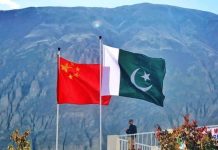DM Monitoring
BEIJING: “I cannot help thinking how wonderful it would be if an exquisite Swiss army knife could be made for our world affairs. When there is a problem, we can use the knife to fix it.”
When Chinese President Xi Jinping presented that analogy in his keynote speech at the United Nations Office at Geneva in 2017, the world was facing a fork in the road between multilateralism and isolationism, openness and protectionism.
Xi, in the speech, also elaborated on his vision of building a community with a shared future for mankind, pointing to the direction in which China was determined to work with the rest of the international community to forge a more prosperous future for all.
Four years later, Xi’s penetrating vision is more relevant for today’s highly interconnected and deeply troubled world. The gravity of choosing between the notion of a shared future and the zero-sum Cold-War mentality has grown all the more apparent. And the world’s need for a multi-functional tool to tackle daunting global problems has turned ever more urgent.
The revelation of the COVID-19 pandemic is as clear as it is compelling. In face of the attack by an unknown virus, the inevitable reality that the fate of all countries on this planet is bundled together can speak for itself.
A real Swiss knife demands true craftsmanship to make. To forge such an instrument of common good for humanity’s better and shared future, the world should come together in the first place.
As pressing problems like the pandemic, climate change and terrorism are global in nature, turning inward and hiding behind ideological entrenchment will only allow the deadly pathogen to kill more people, melting glacier to vanish at a faster pace and terrorists to stage more attacks against innocent civilians.
Therefore, nations of the world should foster even stronger networks of partnership for the long-term security and general welfare of the people on this planet.
Pursuing win-win cooperation instead of zero-sum confrontation is equally essential.
In this age of globalization, no country can either preserve or promote its own interests without considering those of others. Win-win cooperation for shared benefits is the only viable solution.
To be more specific, dialogue and consultations between different countries can avoid conflicts; dynamic global free trade without barriers can spur economic growth; exuberant cultural exchanges can bridge misunderstandings; low-carbon and green growth can re-balance the relationship between the environment and the human society.
Democratizing international relations and improving global governance is also imperative.
Modern history has witnessed mankind’s progressive pursuit for a fair and equitable international order. That relentless odyssey has been coded in the texts of the Peace of Westphalia, the Geneva Convention, and the landmark UN Charter.
To carry this task forward, countries around the world, big or small, should manage global affairs collectively and write the world’s rules of the road together so as to avoid the dominance of the globe by just one or several major powers.






